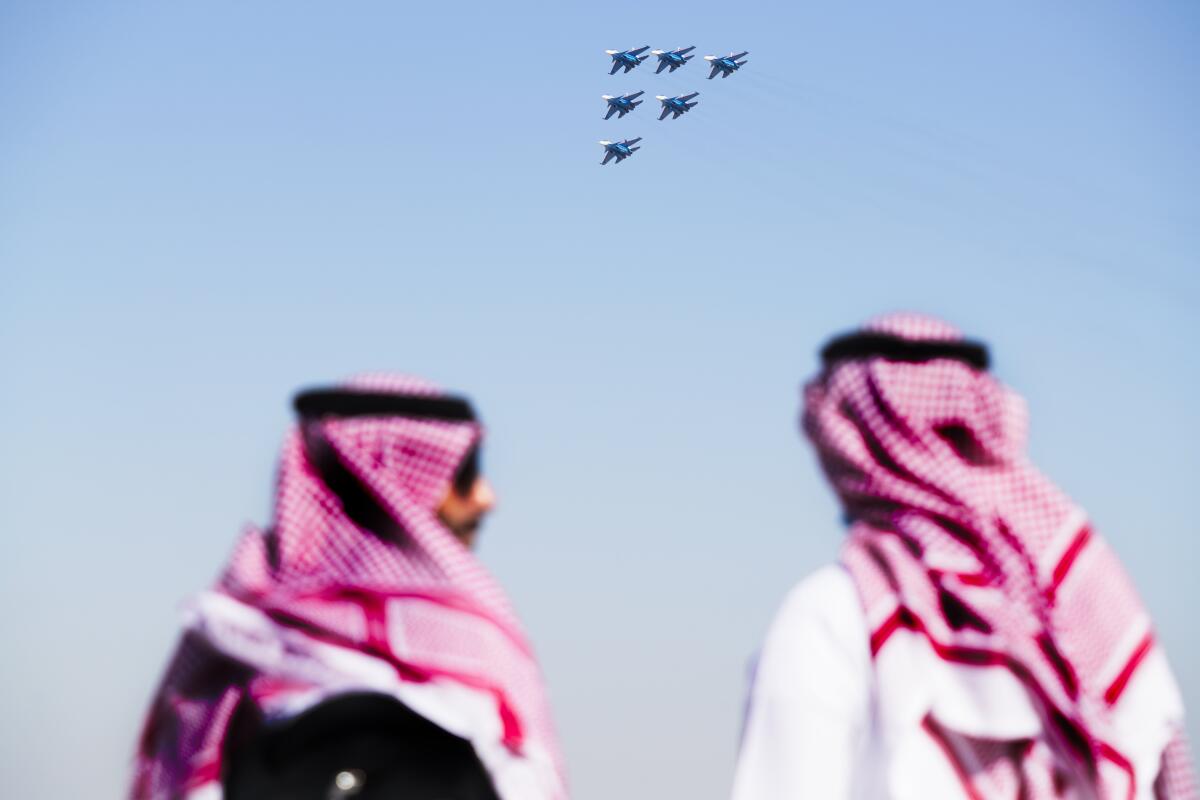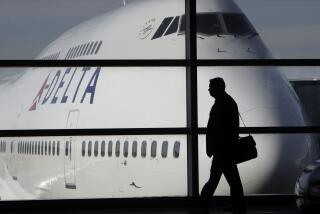Dubai Air Show opens to aviation industry on the mend amid COVID-19

- Share via
DUBAI, United Arab Emirates — Dubai’s biennial air show opened Sunday to a world still reeling from the pandemic and an aviation industry hard-hit by the coronavirus, but on the mend.
Boeing and Airbus have traditionally been the stars of the aviation trade show, competing for multibillion-dollar Gulf-based airline purchases and hammering out final details minutes before back-to-back news conferences. This year, however, the five-day exhibition is expected to be more muted than in the past due to the subdued state of flying and travel amid the COVID-19 pandemic.
Rather, the air show’s first day drew eyes toward defense and military hardware from countries such as Russia and Israel.
The day’s blockbuster commercial deal by Airbus was a sale of 255 new aircraft to Indigo Partners’ low-cost carriers. The agreement sees purchases of 102 new planes by Wizz Air of Hungary, 91 by Frontier in the U.S., 39 by Mexico’s Volaris and 23 by South American JetSmart. The package includes a mix of A321neo and A321XLR aircraft. At Airbus’ pre-pandemic list prices, the order would total more than $30 billion. The company declined to provide any details on the sale price.
Airbus also secured an order for two additional A330 aerial refueling aircraft with the United Arab Emirates’ air force, bringing to five the country’s Airbus multirole tanker transport fleet.
The star on the tarmac outside the exhibition hall was Russia’s Checkmate fighter jet, which was shown to the media in a custom-built hangar with a display of laser lights bouncing off a mirrored ceiling. The jet, with a baseline $35-million price tag, is a less costly competitor to the U.S. F-35, which the UAE has been trying to acquire since formally recognizing Israel last year in a deal brokered by the Trump administration. That sale has slowed under President Biden.
In a dramatic promotional video, the Checkmate soared through burnt orange skies, blasting away targets in the desert as music blared in the background and a thundering voice-over rattled off the plane’s features.
“The idea was born as we used all the experience that Russia got during its Syria operations and many of the features of the aircraft came from realistic situations that we experienced,” United Aircraft Corp. Chief Executive Yuri Slyusar said through a translator at the unveiling. In Syria’s devastating civil war, Russian fighter jets have supported President Bashar Assad’s forces.
United Aircraft is a holding company of state-owned Rostec, Checkmate’s parent company. Production of the jet is expected to start in 2025.
Also, more than 100 U.S. companies are exhibiting at the air show, including defense giants Lockheed Martin and Raytheon.
“We are committed to deepening and strengthening this vital strategic relationship,” said Sean Murphy, the U.S. Embassy’s charge d’affaires. At the opening of the U.S. pavilion, he also thanked the UAE for its help in the U.S.-led evacuations out of Afghanistan.
Meanwhile, Brazil’s President Jair Bolsonaro roamed the tarmac outside the booth of Brazilian aerospace company Embraer, inspecting the interior of the company’s hulking C-390 Millennium transport aircraft, smiling and waving to crowds of reporters.
French Defense Minister Florence Parly surveyed the diversity of helicopters and maritime patrol aircraft at the Airbus pavilion, surrounded by French airmen in uniform.
Boeing brought its new 777-9 passenger jet from Seattle in the longest flight to date for the aircraft as it undergoes continued tests and awaits regulatory approval. Boeing says it will be the world’s largest and most efficient twin-engine jet. The Middle East’s largest carrier, Emirates, has ordered 126 of this 777X, but the Dubai airline has expressed frustration with delays around its delivery, which is not expected before late 2023.
Airbus took journalists through a version of the A320neo, which had been converted into a luxury corporate jet replete with a large bed, walk-in shower and sprawling sitting area with couches and coffee tables. China’s state-owned defense firm CATIC displayed a range of anti-aircraft missiles, munitions and fighter jets. An Emirati airman inspecting a U.S.-made Chinook CH-47 noted that the transport helicopter had been supporting Emirati forces on recent missions in Yemen and Afghanistan.
Israeli companies displayed their hardware for the first time at the air show after Israel’s normalization of diplomatic ties with the UAE last year. The state-owned Israel Aerospace Industries company showed off manned and unmanned naval and aerial drones.
Israel’s Rafael Advanced Defense Systems displayed its “drone dome” that detects and destroys drones with lasers. Emirati defense officials were seen asking about the range and weight of the anti-drone system at the Israeli pavilion. In all, six Israeli companies are taking part in the air show.
Israeli Defense Minister Benny Gantz described the UAE-Israel partnership as a “strategic asset,” saying in a statement that the Defense Ministry’s participation “reflects the deepening relations” between the two nations. The two countries share deep concerns over Iran, which is set to resume negotiations over its tattered nuclear deal with the U.S. and other world powers.
The air show is taking place near Dubai’s Al Maktoum International Airport, a second and smaller international hub to Dubai’s main airport, which is the world’s busiest for international travel.
With vaccine rollouts in many nations worldwide, the airline industry as a whole is recovering from last year’s roughly $138-billion net loss.
Still, the industry continues to face losses this year and next. The International Air Transport Assn. forecasts net losses for airlines of $52 billion this year and $11.6 billion in 2022.
Although commercial travel remains uncertain amid the pandemic, cargo volumes are already above pre-pandemic levels. Some airlines have ripped out seats on their grounded passenger flights and transformed their aircraft into cargo planes.
On the back of that growing demand, Boeing announced plans to add three conversion lines — one in the United Kingdom and two in Canada — to convert commercial aircraft to freight carriers. Boeing also signed an order with Icelease for 11 of its 737 freighters.
More to Read
Sign up for Essential California
The most important California stories and recommendations in your inbox every morning.
You may occasionally receive promotional content from the Los Angeles Times.










